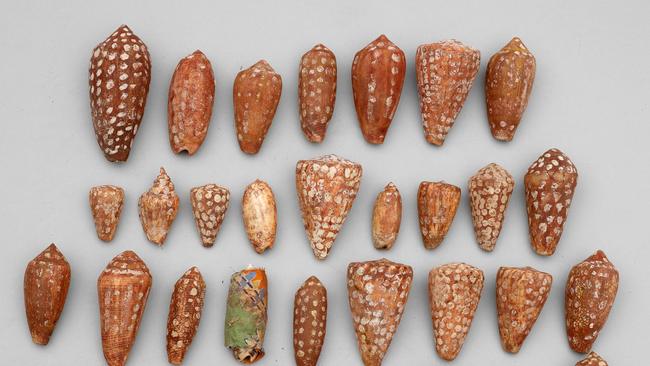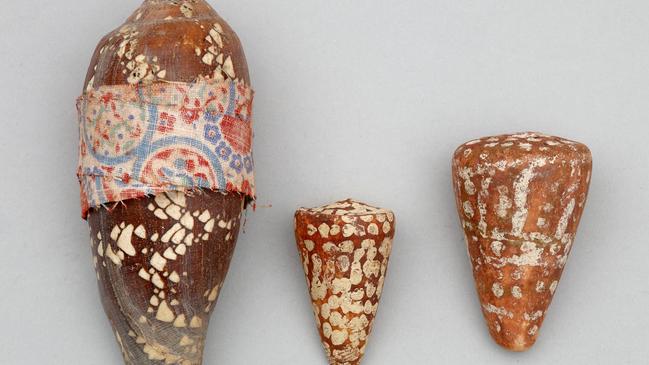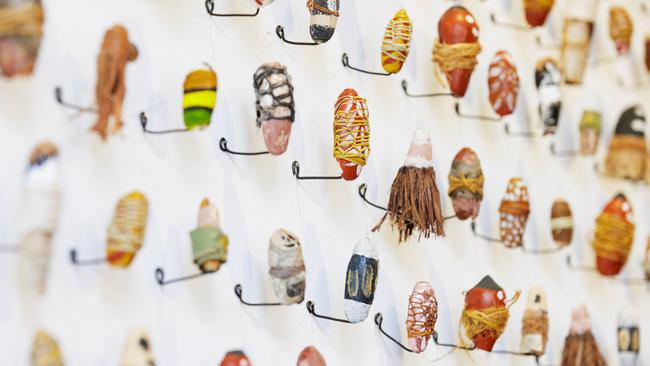Aboriginal items returned to Anindilyakwa community in landmark project
In a landmark repatriation project, a northern Australian Aboriginal community has been reunited with key cultural heritage items, including shell dolls.

National
Don't miss out on the headlines from National. Followed categories will be added to My News.
The Aboriginal Anindilyakwa community of Australia’s Northern Territory is celebrating the return of 174 cultural heritage items, as part of a landmark repatriation project organised with Manchester Museum.
The cultural heritage material was formally returned to representatives of the Anindilyakwa community, who travelled from Groote Eylandt, an island located approximately 50km from the north coast of mainland Australia, during a handover ceremony at Manchester Museum on Tuesday.
The process of returning these items is already supporting Anindilyakwa cultural strengthening and revitalisation. Descendant generations are using the items to connect with their heritage and set up a contemporary art project inspired by traditional practices.
“The Anindilyakwa Land Council represents the 14 clans who are the Traditional Owners of the land and seas of the Groote Archipelago, and the repatriation of the Worsley Collection by Manchester Museum is an important step for the ALC in pursuing one of our core visions: to ‘protect, maintain, and promote Anindilyakwa culture’,” said Thomas Amagula, Deputy Chair of the Anindilyakwa Land Council.
“We have only just begun to appreciate how valuable the repatriation of the Worsley collection will be in the future.”

One of the highlights of the collection being returned is a group of dolls made from shells – Dadikwakwa-kwa in the Anindilyakwa language – which have unlocked a rich cultural history and inspired the Dadikwakwa-kwa Project, led by female artists from Anindilyakwa Art Centre, a finalist in the 2023 National Aboriginal and Torres Strait Islander Art Awards.
Two of the artists, senior elder Noeleen Lalara and emerging leader Maicie Lalara, are part of the delegation of Anindilyakwa women that were present at Manchester Museum for the handover, alongside emerging leader Amethea Mamarika.
The Dadikwakwa-kwa Project was partly inspired by the conversations that took place with Amethea’s grandmother (Old Lady Edith Mamarika) on Groote Eylandt around her memories of the shell dolls now being returned. The shell dolls were traditionally painted by parents for their daughters using intricate ochre designs.
Manchester Museum worked collaboratively with the Australian Institute of Aboriginal and Torres Strait Islander Studies (AIATSIS) and the Anindilyakwa Land Council over a three-year period, with support from UNESCO, to determine where the collection of items should live.

AIATSIS acting chief executive Leonard Hill said: “AIATSIS and the Manchester Museum have a productive and committed partnership and I thank them for their collaborative and ethical approach to caring for their collections and respecting the Anindilyakwa community’s wish to have their material returned to Country.
“This is a highly significant return and demonstrates how respectful partnerships between AIATSIS, First Nation communities and overseas collecting institutions can create opportunities for people to encounter, engage and be transformed by the stories of Aboriginal and Torre Strait Islander Peoples.”
Manchester Museum has collaborated with AIATSIS over the past five years and previously returned sacred and ceremonial items to Aboriginal communities. The current repatriation embraces the full scope of the United Nations Declaration on the Rights of Indigenous Peoples by returning material beyond the secret, sacred and ceremonial that is important to the traditions and memories of the Aboriginal community that made them.
Georgina Young, Head of Exhibitions and Collections, Manchester Museum said: “Having spent time on Groote Eylandt at the invitation of the Anindilyakwa People makes reaching this point of handover feel momentous in a different way to any of Manchester Museum’s past returns. Sitting with Elders and hearing them discuss this collection on their land in their terms has enabled me to understand and care in ways not possible in a store room in Manchester, and brought us to a place of understanding together.
“We are excited by all that this return makes possible in terms of future partnership, but more so by how it supports Anindilyakwa cultural strengthening for years to come.”
Australian High Commissioner to the United Kingdom, Stephen Smith, added: “The return of these significant cultural heritage items is important for Australia’s reconciliation process. It also helps renew cultural practices and safeguard such practices and items for future generations.
“Returning this collection of items to representatives of the Anindilyakwa community and the children and grandchildren of those who made them is a great thing.”





